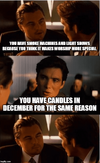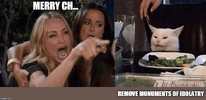Simple question: where in God's Word has He instituted the annual celebration of Christ's birth on December 25th as a form of public or even private worship? And if you believe that we are at liberty to ordain for ourselves and for the church special days of worship not instituted by God, on what ground do you believe this?
Navigation
Install the app
How to install the app on iOS
Follow along with the video below to see how to install our site as a web app on your home screen.
Note: This feature may not be available in some browsers.
More options
You are using an out of date browser. It may not display this or other websites correctly.
You should upgrade or use an alternative browser.
You should upgrade or use an alternative browser.
Regulative Principle and Christmas
- Thread starter Rescued
- Start date
- Status
- Not open for further replies.
I'm not sure how any member if they believe that can answer, since defense of anti confessional views (defense of the normative principle for instance and disputing the regulative principle) is not allowed. *and thread moved to the appropriate sub forum.
Jonathan95
Puritan Board Sophomore
My church is OPC and they "celebrate" it. I'll probably ask them why during the Christmas Eve service.
Grant
Puritan Board Graduate
I’m against it, but am happy to submit to extra services and birth of Christ sermons with joy and thankfulness. HOWEVER, I am against the man made “worship” that gets a pass even in confessional bodies such as candle worship and other man made ceremonies that some how only get “required” status during this man made season, or somehow get a pass by not being called “worship” but an act of devotion in a called service by some liturgical lingo ju-jitsu.
Okay I’ll stop
P.S. I do agree elder’s have the authority to call their flock to special days of remembrance. I just fail to see the wisdom of doing so on a day where the flock is prone to so much idolatry both from within Christianity.
Okay I’ll stop
P.S. I do agree elder’s have the authority to call their flock to special days of remembrance. I just fail to see the wisdom of doing so on a day where the flock is prone to so much idolatry both from within Christianity.
Last edited:
Andrew35
Puritan Board Sophomore
Welcome to the choir, Preacher.Simple question: where in God's Word has He instituted the annual celebration of Christ's birth on December 25th as a form of public or even private worship? And if you believe that we are at liberty to ordain for ourselves and for the church special days of worship not instituted by God, on what ground do you believe this?
If we believed in choirs!Welcome to the choir, Preacher.

CJW
Puritan Board Freshman
Simple question: where in God's Word has He instituted the annual celebration of Christ's birth on December 25th as a form of public or even private worship? And if you believe that we are at liberty to ordain for ourselves and for the church special days of worship not instituted by God, on what ground do you believe this?
He hasn’t; I don’t.
Sent from my iPad using Tapatalk
A good question to ask is why are the "birth of Christ sermons" given in December? And why December 25th? What's the significance of December 25th, is that really the day Christ was born, or is there a different reason that day was chosen when this day was instituted by men?I’m against it, but am happy to submit to extra services and birth of Christ sermons with joy and thankfulness. HOWEVER, I am against the man made “worship” that gets a pass even in confessional bodies such as candle worship and other man made ceremonies that some how only get “required” status during this man made season, or somehow get a pass by not being called “worship” but an act of devotion in a called service by some liturgical lingo ju-jitsu.
Okay I’ll stop
P.S. I do agree elder’s have the authority to call their flock to special days of remembrance. I just fail to see the wisdom of doing so on a day where the flock is prone to so much idolatry both from within Christianity.
Grant
Puritan Board Graduate
You’ll get no defense from me brother. Typically around the man made “liturgical” days I fight back the inner Gollum more than usual:A good question to ask is why are the "birth of Christ sermons" given in December? And why December 25th? What's the significance of December 25th, is that really the day Christ was born, or is there a different reason that day was chosen when this day was instituted by men?

Nice...lolYou’ll get no defense from me brother. Typically around the man made “liturgical” days I fight back the inner Gollum more than usual:
View attachment 8707
I am generally against Christmas, and absolutely against it in the public worship of God. However, is it correct to say that celebrating Christmas is altogether unconfessional, given the Second Helvetic Confession’s stance on holy days?
“If in Christian liberty the churches religiously celebrate the memory of the Lord’s nativity, circumcision, passion, resurrection, and of his ascension into heaven, and the sending of the Holy Spirit upon his disciples, we approve of it highly.”
—Second Helvetic Confession 24.4.
For churches that hold to presbyterianism it is unconfessional going back to the Scots rejection of that segment of the 2nd Helvitic, which they rejected specifically while otherwise commending the text that was sent to the Scottish Kirk (1566?)
I am generally against Christmas, and absolutely against it in the public worship of God. However, is it correct to say that celebrating Christmas is altogether unconfessional, given the Second Helvetic Confession’s stance on holy days?
“If in Christian liberty the churches religiously celebrate the memory of the Lord’s nativity, circumcision, passion, resurrection, and of his ascension into heaven, and the sending of the Holy Spirit upon his disciples, we approve of it highly.”—Second Helvetic Confession 24.4.
There have been quite a number of threads on this subject in the board's nearly 20 years. The defenses within reformed presbyterianism at least are the freedom to do nativity sermons this time of year since its on the folk's minds. (Our church had one today; part one of two; so, I get a second dose next week; today's needed a punch or two more to be more clearly an anti holy day nativity sermon). But then I see Presbyterian ministers extolling their candle lit carol service on Facebook. If you object you'll get "but it's just a circumstance (the candles). What? Did the power go out? I don't believe that defense for a second; poll the congregation on why they have candles and I'm sure you'll get "oh, it makes the worship so special."


Last edited:
Christmas is -literally- of antichrist. The principle behind it is the same one as all idolatry co-opted under guise of the true religion before it, regardless of antiquity, earnestness, sincerity, or ignorance: Man’s inventions. The doctrines and commandments of men always serve to push out the commands of God. In the case of silly season (and Easter, etc.) the 4th Commandment is lessened in esteem, along with other aggravations. It is also based on -at best- a date that is not known to us, and -at worst- a lie. The secret things belong to the Lord our God, to us are those things which are revealed, namely to do all the words of the Law of God. Observing man made holy days ain’t one of those.
Romans 14 was written to a mixed bag of Jews and Gentiles during a time of transition between the Old and New Covenant, during which time, great charity was necessary. Many Jewish believers still felt the need to celebrate the feasts that had been appointed by God in the scriptures and didn't quite grasp the fact that these things were passing away with the institution of the New Covenant. But to the Galatian church, the same apostle rebukes them for going back to observing special times and days, which he calls "weak and beggarly elements" of the world. He even said he was afraid he had wasted his time with them because of this.
Well said.Christmas is -literally- of antichrist. The principle behind it is the same one as all idolatry co-opted under guise of the true religion before it, regardless of antiquity, earnestness, sincerity, or ignorance: Man’s inventions. The doctrines and commandments of men always serve to push out the commands of God. In the case of silly season (and Easter, etc.) the 4th Commandment is lessened in esteem, along with other aggravations. It is also based on -at best- a date that is not known to us, and -at worst- a lie. The secret things belong to the Lord our God, to us are those things which are revealed, namely to do all the words of the Law of God. Observing man made holy days ain’t one of those.
Since I couldn't possibly get in more hot water (actually, I could!), here's another meme I made a few years ago when I finally found out what they were. See the LC 108, Gillespie on removing such, and the principle is a facet of a number of reformed confessions.


I love that you use memes. lolSince I couldn't possibly get in more hot water (actually, I could!), here's another meme I made a few years ago when I finally found out what they were. See the LC 108, Gillespie on removing such, and the principle is a facet of a number of reformed confessions.
View attachment 8709
FivePointSpurgeonist
Puritan Board Freshman
What is candle worship??I’m against it, but am happy to submit to extra services and birth of Christ sermons with joy and thankfulness. HOWEVER, I am against the man made “worship” that gets a pass even in confessional bodies such as candle worship and other man made ceremonies that some how only get “required” status during this man made season, or somehow get a pass by not being called “worship” but an act of devotion in a called service by some liturgical lingo ju-jitsu.
Okay I’ll stop
P.S. I do agree elder’s have the authority to call their flock to special days of remembrance. I just fail to see the wisdom of doing so on a day where the flock is prone to so much idolatry both from within Christianity.
Well, truth be told, in several years I have two; I have two memes; and you've seen them both here.I love that you use memes. lol
I do have Naphtali Press memes but they are more just quotations with a portrait; mini versions of Daniel's blog @Reformed Covenanter
I know that was my response to you lol sorry I couldn't figure out how to fix it@Rescued, check out your post #17 above. You seem to have accidentally put your words in a quotation box attributed to me.
Nice I downloaded it for reading!Since I couldn't possibly get in more hot water (actually, I could!), here's another meme I made a few years ago when I finally found out what they were. See the LC 108, Gillespie on removing such, and the principle is a facet of a number of reformed confessions.
View attachment 8709
If you like it; get the full book; only a few copies left of the printing, available at RHB (no link today; look tomorrow).Nice I downloaded it for reading!
Ryan&Amber2013
Puritan Board Senior
I heard recently that the date is fitting because the winter solstice (darkest day of the year) falls just before Christmas, so the idea of celebrating at this time is to symbolically have light appear at the darkest time.
I like the secular festivities but have no interest in the religious side of it. I'll study and meditate on Christ's birth any time of the year. I don't need a calendar to tell me when to do it.
I like the secular festivities but have no interest in the religious side of it. I'll study and meditate on Christ's birth any time of the year. I don't need a calendar to tell me when to do it.
It’s hard to escape the religious side of it, as its very name takes the Lord’s name in vain. We should have nothing to do with it.
Grant
Puritan Board Graduate
I would say when candles are used symbolically during a called gathering of the people for a service unto to the Lord in a non-circumstantial manner. (Example of candles as a circumstance: the power going out just prior to service and lighting candles so the sheep can see for safety and to follow along with text.)What is candle worship??
Typically these “extra special” services are advertised as some form of candle light service. I have heard of several ministers to leave out the Call to Worship and Benediction as to supposedly make allowance as the candle ceremony not being worship proper. However, this seems to be more of a loop hole approach (think commissioning deacons vs. ordination) for conscience as you’ll find most congregants and advertising to have thoughts towards identifying the practice as a special worship time.
Sadly, many ministers would get the boot if they tried to bring reform in this area in seeking to align with the RPW. For many churches, this special service often results in more seats-filled in the pews than the regular Lord’s Day evening services.
Last edited:
Ed Walsh
Puritan Board Senior
Typically these “extra special” services are advertised as some form of candle light service. I have heard of several ministers to leave out the Call to Worship and Benediction as to supposedly make allowance as the candle ceremony not being worship proper. However, this seems to be more of a loop hole approach (think commissioning deacons vs. ordination) for conscience as you’ll find most congregants and advertising to have thoughts towards identifying the practice as a special worship time.
I've told my elders (respectively as I could) that candlelight and similar services are equivalent to a married man's claim that he is only "getting a little on the side."
- Status
- Not open for further replies.
Similar threads
- Replies
- 14
- Views
- 3K
- Replies
- 19
- Views
- 3K
- Replies
- 33
- Views
- 3K
- Replies
- 1
- Views
- 839
- Replies
- 12
- Views
- 2K


